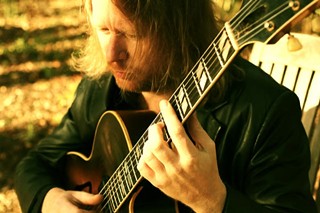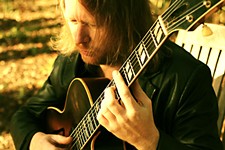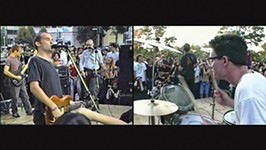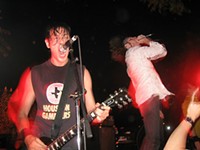The Complete Jake Langley
Guitarist makes dazzling choices and then some
By Tim Stegall, 11:07AM, Fri. Mar. 28, 2014
Jake Langley of Toronto may be a relative newcomer to Austin, having moved here in 2010, but he’s impressed huge swaths of the local music scene. Jazz heads upstairs at the Continental Club for Church on Monday, Tex-Mex two-steppers at raucous Los Texmaniacs gigs, and even Dupree fan Mike Judge can attest to Langley’s guitar prowess.
As detailed in this week’s Music feature, the local guitarist made a name for himself in NYC with jazz great Joey DeFrancesco’s organ trio, but almost any night of the week, you can find Langley applying guitar both thoughtful and incendiary on bandstands across town. He may look like an elegant version Zakk Wylde, but he shreds from the head and heart, not just the crotch.
Only a small fraction of our conversation made it into the paper, so here’s the bulk of our interview.
Austin Chronicle: Rock & roll drummers from the Sixties had clearly listened to jazz drummers of the Forties and Fifties, whereas today’s drummers only listen to rock drummers.
Jake Langley: Most of those Sixties guys aspired to be jazz drummers. Or guitar players, bass players. But the money was in the studios. So, if you reached a certain level of proficiency, like Hank Garland or Earl Palmer....
AC: Hal Blaine!
JL: Hal Blaine, exactly! They really were jazz drummers. Everything kinda came out of jazz and big band playing at the time. Prior to the war, that’s all there was, really. Country music hadn’t developed. It was kinda in its folk/bluegrass form. So, pre-war, that generation of Fifties musicians would’ve only really known how to play jazz music, or aspire to be jazz musicians. And they certainly invented rock & roll, country music, soul music, R&B.
The only difference would be the trajectory of Chicago blues, which sorta paralleled the blues in New Orleans and the development of it in New York. I’m a huge fan of all that, all the Chess Records stuff.
AC: That’s the original rock & roll, right there.
JL: To me, it is. And jazz, for that matter. Having worked with musicians like Pinetop Perkins and people of that legacy or that lineage, I know them to have had a huge reverence for jazz music. Boogie-woogie is very similar to what Count Basie was doing, where Duke Ellington came from, Professor Longhair. They have a real reverence and respect for it even though they were clearly a blues and rock & roll-kinda thing. The lineage of American music to me is fascinating and I’m a huge student of it.
AC: You grew up in Toronto, correct?
JL: That’s true, yeah.
AC: Yet, you’re so steeped in American music.
JL: Well, when I was a kid, my father and my uncle were big influences and I played in their bands. And for me, listening to American music was the real deal. That was what we did at night. We didn’t gather around the TV. We listened to records, my family, and we played in bands. And we tried to emulate American music, so we often had discussions with my uncle about, “Well, see, the bass and drums really laid back on that. That’s very American.” So, we were kinda schooled in that. As a Canadian, I think we had more respect of real American music than maybe a lot of Americans.
AC: You played with k.d. lang, right?
JL: Yes, I did.
AC: How long?
JL: Well, it was sort of on and off. She’s a Canadian icon, and at the time, she’d moved to Los Angeles and would come back and do television performances and such. I’m a huge fan. She’s a brilliant song interpreter and just a crazy artist.
AC: What about punk rock – any interest there?
JL: My wife’s a big punk rock fan. She had a punk rock band in the Eighties in Montreal. I was never really exposed to the music when I was in high school. When that was really popular, I was into, as we just discussed, jazz, blues, country. My goal was to be a session musician. I was into reading music and doing that kinda stuff.
Punk escaped my peripheral acknowledgement of what was going on. What I really loved was the aesthetic of it, and I think that the energy, what it means to me, is exactly the same as it meant to be Ernest Tubb in the day, or Jimmy Smith, whom I had the pleasure of playing with before he died. Or Duke Ellington, or Count Basie. It’s really all the same, the energy.
AC: Harlan Howard once defined country music as “three chords and the truth.” You could say the same thing for punk rock.
JL: Yeah! And really, for me, the era of jazz I like, you could say the same thing. And Little Walter. Which brings up a very important part of it for me, which is: Music has always had a social context. It really does, whether it’s the voice of a generation’s social/political movement or whether it’s two people getting romantically involved and there’s a soundtrack. Maybe they went to see a Diana Krall concert – that’s their connection.
Really, what we’re talking about is feelings for an entire group of people, socially, culturally. Or two individuals. Removing music from social context is useless, and that’s where I kinda stress that everything I do and I love in music comes with a context. Whether it’s recording young bands or working with the artists that I work with, it’s about understanding that context. Which is what we’re talking about.
AC: I see David Clayton Thomas’ name on your resume.
JL: Yes! He’s from Toronto. I got to work with him when he moved back to Toronto. He had left Blood, Sweat & Tears and recorded a series of jazz records, singing standards basically. And I have to say, he is – in my opinion – one of maybe half-a-dozen iconic voices of rock music. Obviously we can make our judgments of who they are, but he’s one of them for me. To hear him sing standards was really remarkable. He’s a real artist and a wonderful guy. It was one of my dreams fulfilled to have worked with him.
AC: And another Canadian icon, Garth Hudson.
JL: Oh, Garth! Yeah, I got to work with Garth. Garth came up to play in Toronto at a wonderful club we used to have there called the Top of the Senator. I played in a duo with him for a series of week-long engagements. Like you said, another Canadian icon. Also a music historian.
AC: Bill Cosby?
JL: Yeah! We were scheduled to do a tour with Jimmy Smith, and unfortunately, he passed three days before the opening of our tour. We were playing at Yoshi’s in Oakland, and in his honor Bill Cosby showed up and played drums with us and sang a number of songs. I didn’t know this until Bill told the story, but his first gig as a comedian was opening up for the Jimmy Smith Trio at a club in New York back in the Sixties. So, he ended up touring as an opening act, because back in those days, they would always have a comic and then jazz.
Bill was actually an accomplished jazz be-bop drummer and played with us. Knew all the tunes, so it was a real thrill, of course. And I have a cassette recording somewhere of that. We actually did an NPR broadcast, and [saxophonist] James Moody was there and a number of other individuals that have played with Jimmy. But yeah, Bill Cosby! I can add that to my resume.
AC: What about your other local organ trio, Dupree? Tell me about that project.
JL: Because it’s a trio, we’re a very creative and open jam kind of situation. The inspiration of that band was a band [jazz guitarist] Grant Green had in the late Sixties and early Seventies. They had a couple of live records, like Live at Club Mozambique. It’s very organic. It’s almost the inspiration for the jam band scene. And although we pay a lot of tribute to the organ trio, it’s a little more funk and soul and church-based. It’s a lot of fun. There’s a lot of dancing that goes on.
See, those bands, those organ trios ultimately were hired in the chitlin circuit because they were cheap. They could have a bass player and an organ player all at once. They could have a guitar player and a drummer, and they would play the pop tunes of the day.
AC: You produced Pinetop Perkins’ final recording sessions.
JL: That was one of the highlights of my life, getting to do that. And I love this new band that I just produced, the Night Owls, a really great soul band. We had a fun time doing that. I hope it doesn’t stop! I hope the phone keeps ringing [laughs]. I love producing. I love working in the studio. I think that all the music I listen to, all the recordings I’ve listened to – the actual sound, the sonic environment – made a very big impression on me. When I listen to those Chess Records, Howlin’ Wolf records, they have a sound.
The same with the Blue Note records, and all those beautiful records done at Capitol Records. The sonic environment is as important as anything. I didn’t realize that until into my 30s, when I started recording. In early 2000, I got a gig in Toronto working for a 24-hour jazz station called Jazz at Home. I got this call to engineer and record all their remote live concerts.
So, I got to record Roy Hargrove and all these people. I’d show up at the gig and they’d be happy to see me, because I’m a jazz musician and I know what it’s supposed to sound like. It was hundreds of concerts! I would mix them and have them ready for a radio broadcast the following week. So I had a studio at my house that I would mix them at, and I’m actually a very accomplished recording engineer. That’s a big part of what I do, too. Combining all those things together makes for an exciting, diverse, and never boring career.
AC: Even when you’re playing jazz dates I see you playing a vintage Fender Deluxe.
JL: Yes, early Sixties.
AC: It’s a tube amp. It’s kinda unusual to play those in jazz.
JL: Yeah, I don’t use any equipment before 1965. That was the last time guitars sounded good to me [laughs]. I figure, “If those guys use that kind of equipment....” Obviously, I have pedals and stuff, but the last guitar sound that I really liked was pre-1965.
That goes for rock music, too. For what it’s worth, [Jimi] Hendrix and [Jeff] Beck, they were using gear from pre-1965, too. So they obviously concurred. I’m not saying I don’t like any guitar players post-’65. I just think the tone of the equipment was better. That goes for all the equipment I have in my studio: Wurlitzers, Rhodes pianos. I think that was the pinnacle of electrical engineering, pre-circuit boards or whatever they did. Tubes and....
AC: Germanium transistors, if you have to have transistors.
JL: Yeah. If you have to have them, that was it. And I’m not a super-techie, but I certainly know what I like. Anything with transistors, and later circuit boards, or in the spirit of doing something cheaper, we’ve lost that. The last car I liked was 1972 [laughs], with a carburetor. I get all the engineering. I like the human engineering of it. It’s just more fun for me. I like 8-tracks [laughs]. I like the sound of an 8-track.
AC: That’s the first conversation you and I had.
JL: Yes. You know what’s interesting about modern recording techniques that nobody ever talks about? Computers and modern technology enable you to put off making choices. If you think about the Beatles recording Sgt. Pepper and even before that, you had to make choices on the takes. You had to plan out what you were going to do first. It’s very much like sculpture. Once you cut that area away from the block, it’s cut away. You can’t start again. You just can’t say, “Oh, well, I’ll just undo this forever.” You can’t do that. You have to make those choices.
I like that part of the creative process: “What are we going to do here? Are we going to keep this? Or are we gonna make another choice?” Once it’s done, the choice is made. It’s made. That’s the product. If you continually put off making choices, you have infinite number of takes, infinite number of overdubs, infinite number of choices. That to me waters down the decision-making. And ultimately, we’re listening to a recording, looking at a painting, looking at a sculpture, processing an artistic expression that’s deemed finished. We’re looking at an artist’s choices. And we’re respecting really good choices.
So, I like making good choices early on. That’s why I love jazz music, blues music, soul music, because you have to make the choices when you play it initially. You have to actually go, “This is what I played. That’s it. That’s what the photograph looks like.”
A note to readers: Bold and uncensored, The Austin Chronicle has been Austin’s independent news source for over 40 years, expressing the community’s political and environmental concerns and supporting its active cultural scene. Now more than ever, we need your support to continue supplying Austin with independent, free press. If real news is important to you, please consider making a donation of $5, $10 or whatever you can afford, to help keep our journalism on stands.
Dec. 8, 2023
Aug. 11, 2023
Jake Langley, Cannonball Adderley, Wes Montgomery, Chet Atkins, Ernest Tubb, Texas Troubadours, Barney Kessell, Kenny Burrell, Hank Garland, Steve Cropper, BB King, Freddie King, Joe Nick Patoski, Willie Nelson, Bee Spears, Pinetop Perkins, Professor Longhair, Church on Monday, Dupree, Los Texmaniacs










